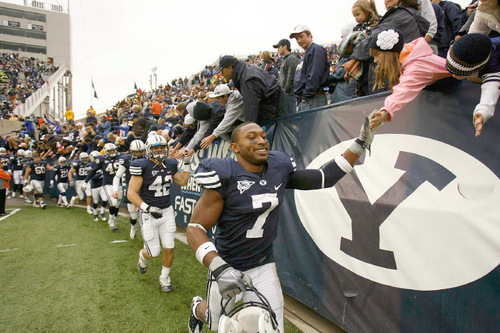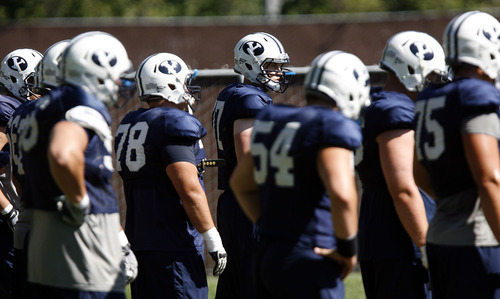This is an archived article that was published on sltrib.com in 2011, and information in the article may be outdated. It is provided only for personal research purposes and may not be reprinted.
When the invitation comes from the Big 12 Conference and BYU administrators study all the possibilities, they will discover four compelling reasons to join the league. They're right there on the school's 2011 home football schedule: San Jose State, Idaho State, Idaho and New Mexico State.
Actually, that makes 64,000-plus reasons why BYU should make the move.
Amid the motivation of enabling the Cougars' built-in national following to access their games as an independent program, BYU cannot disregard the fans who fill the seats of LaVell Edwards Stadium. They deserve meaningful games beyond mid-October, which only conference competition can deliver.
The Cougars have become too driven by exposure. They should not forget who built this program: the people who clog I-15. Playing in the Big 12 might reduce BYU's programming distribution somewhat, but the home schedule would appeal far more to the live audience.
Leaving the Mountain West Conference was the right move, as justified by the eight-year ESPN contract and the six-game series with Notre Dame. But if there's a chance to affiliate with the Big 12, the Cougars absolutely have to do it.
It's true that the conference BYU would be joining is not the Big 12 as we once knew it. This is not like the former Pac-10 expanding with Utah and Colorado. BYU (and possibly others) would replace some combination of Texas A&M, now negotiating a move to the Southeastern Conference, and Nebraska and Colorado, which already left.
If they choose to remain independent, BYU officials will cite the school's mission of advertising the LDS Church nationwide and some loyalty to the West Coast Conference, which is accommodating basketball and other sports.
Yet the reasons to jump far outnumber and outweigh the motivation to stay. Bowl Championship Series access, other bowl possibilities, BYU's positioning itself for future movement and the context of a conference race all are critical. Coach Bronco Mendenhall and athletic director Tom Holmoe keep talking about the "risk/reward" of independence, but what's really at stake when any record between 6-6 and 11-1 leads to the same postseason destination?
The coaches and players may remain motivated all season, regardless of the quality of opponents, but how about the fans? Substitute even the Big 12's lower tier — Iowa State, Baylor, Kansas and Texas Tech, for example — for four of this year's home games, and you have a much more appealing schedule.
The 2011 schedule obviously was pieced together in a short time, and BYU fans seem to be very understanding during the transition into independence. I mean, can you imagine buying a seven-game season-ticket package that opens with Utah, but then serves up two Friday games, Idaho State and the WAC's projected three worst teams?
Utah's home schedule is not especially attractive, with Arizona State the only marquee opponent. But at least Washington, Oregon State, UCLA and Colorado are genuine Pac-12 teams.
BYU will play a bunch of high-profile games in the coming years. The issue is, how many of those will be staged in Provo? Fans are promised two visits each from Notre Dame and Georgia Tech, spread over several seasons. Otherwise, most of the Cougars' attractive games will be played on the road or at neutral sites.
That's fine for the program, but not so great for the ticket-buyers.
Those fans deserve Big 12 treatment. BYU should consider them, above the folks scattered around the country.
I never endorsed the accusations such as arrogance or delusion that were attached to BYU's bolting the Mountain West, and I disagreed with anyone suggesting the Cougars believed they were in the same league with Notre Dame.
But if BYU turns down the Big 12, those critics would be right.
Twitter: @tribkurt —





